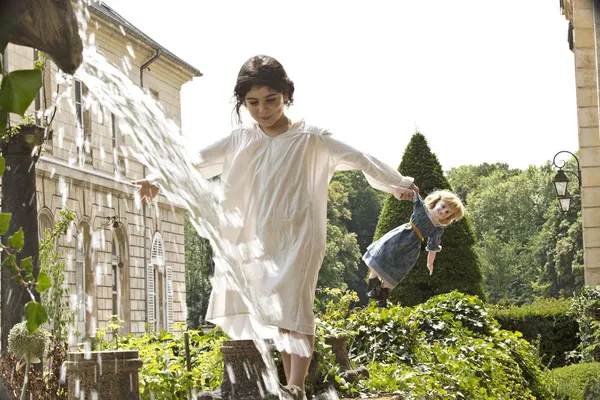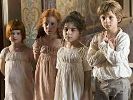Eye For Film >> Movies >> Sophie’s Misfortunes (2016) Film Review
Sophie’s Misfortunes
Reviewed by: Anne-Katrin Titze

There is the theory that having a story with an evil stepmother and a good dead mother - splitting the mother in half, so to say - allows children to deal with their feelings towards their own mother as both good and bad. This can be cathartic for a child. Comtesse de Ségur might argue that three mothers are even better.
Little Sophie (Caroline Grant) who lives in a château with her mother, Madame de Réan (Golshifteh Farahani) is an explorer with endless curiosity and a stubborn streak. Some parents might find her dangerous. Children won't. She is closer to Hayao Miyazaki heroines than Disney princesses, although her relationship with animals is a whole other matter and has nothing to do with the word sidekick, ever.

Christophe Honoré's inciting take on the Comtesse de Ségur's 1858 children's book classics, makes his Sophie's Misfortunes (Les Malheurs De Sophie) a marvelous gem for youngins and adults alike. The film, co-written with Gilles Taurand (Katell Quillévéré's medical thriller Réparer Les Vivants), revels in the in-between times that are so important for children.
Honoré, while keeping a peacock and a kitten real, decided to animate some of the critters that populate this story. It is an inspired solution to address children's cruelty, speak of life and death, and use cartoon immortality to take the sting out of the issue at the same time.
Whereas many mainstream kids' movies kill off the parents, especially fathers, right from the start in order to avoid any possible blame or accusations of neglect - it is mostly the parents buying the cinema tickets and cross-promotion trinkets after all - Sophie's Misfortunes shows the father clearly as a faceless, deliberate absence.
The two episodes of Sophie's life - the second one is based on Ségur's novel The Model Little Girls (Les Petites Filles Modèles) - address issues often ignored by modern stories for children. The model girls are Sophie's pals Camille (Céleste Carrale) and Madeleine (Justine Morin), daughters of Madame de Fleurville (Anaïs Demoustier). Honoré is as precise in his depiction of childhood fears as he is in allowing audiences to revisit the pleasures. Nostalgia transforms to good when it is productive.
A doll, stand-in for a lot of things, is the object that we follow throughout the film. "You are a liar and a thief," Sophie scolds the "horrible doll", a gift from her father. The doll is left outside in the sun, so that the wax of the eyes melts and they drop inside the head. Sophie's mother prepares the "operation" to get it fixed again. And, in a beautifully placed aside, after the flashy work is done to impress the children, she hands it over to a servant who has to sew the head back on and won't get much credit for it.
Two more mother figures will reign. The almost too perfect Madame de Fleurville and the perfectly evil stepmother Madame Fichini (Muriel Robin), a woman who is so mean and insecure that she only likes ugly servants. Fichini would feel right at home in Benoît Jacquot's penetrating version of Diary Of A Chambermaid.
Sophie's cousin Paul (Tristan Farge) is not the only one who sings really badly, in front of a proud audience of relatives, and we laugh with the children and their wild performances, never at them. There is nothing cynical here. The music in the soundtrack reminded me of the best of Seventies European children's programs. With her little pen knife, Sophie slices a freshly picked white cherry in half to make cherry eyes for the stone lions. She uses the same knife to cut up her mother's (animated, don't worry) goldfish before sprinkling the pieces with salt.
The gang of four, Sophie and her playmates Madeleine, Camille and Paul, also catch a red cartoon squirrel whom they feed with real nuts and apples. Its fate is that of many an animated creature which allows us to laugh at its demise while being able to also link what is happening with her sense of the family dynamics.
A painting of a burning boat afloat in a stormy night comes alive and it signals travel, danger and death for anyone to understand. I know this image would have haunted me as a child. In his previous film, Métamorphoses, Honoré took on Ovid and the powerful, loitering legacy of myths by transposing them into a very 21st century landscape, both in thought and nature. In Sophie's Misfortunes, there is less of a rupture, even when the illusion of cinema is addressed. Because it all works together to pay tribute to the tiny, all important, personality-building feelings that are so often forgotten.
Childhood boredom - lazy summer afternoons where the imagination floats over the grass and silly ideas are hatched - has never been presented as astutely on film.
Reviewed on: 10 Mar 2017














